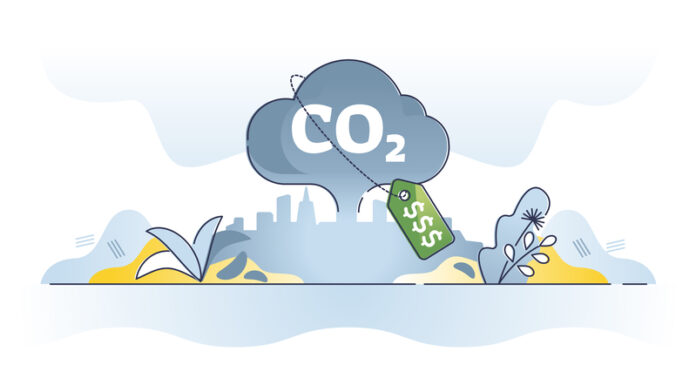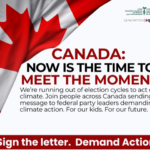Conservative governments in North America introduced market-based solutions to eliminate acid rain back in the 1990s. Conservatives proposed a price on pollution to reduce carbon dioxide (CO2) in the atmosphere in the fight to mitigate climate change.
But in Canada, it was a Liberal federal government that acted to put a price on carbon pollution and it is the current Conservative Party that is opposed. The latter has started an “axe-the-tax” campaign that has encouraged street protests and buy-in from many of Canada’s provincial premiers.
On April 1, 2024, the federal government raised the price of carbon pollution with an average increase of 3.5 cents per litre of gasoline and diesel, as well as proportionate increases on other fossil fuels by raising the benchmark $15 CDN to $80 per ton. Every ton of CO2 or methane (CH4) emitted is, therefore, accounted for through Canadian purchases of fossil fuels. Some have criticized the government for choosing April Fool’s Day to increase the price, but the truth is the date coincides with the start of the federal government’s fiscal year which begins every April. The $15 annual increase is slated to continue each April until at least 2030 when carbon pricing will reach $170 per ton.
A few years ago I joined Citizens’ Climate Lobby Canada (CCL), a voluntary group focused on lobbying the government to work towards a more livable future. CCL has been a staunch advocate for carbon pricing as an effective way to deal with climate change. It has taken this stance because it sees carbon pricing as pivotal to reducing greenhouse gas (GHG) emissions, driving innovation, and safeguarding economic competitiveness. What is interesting is that CCL is a group of everyday citizens who have taken on the task of becoming more informed about carbon pollution and have been sharing what they have learned with their political representatives. It has proved to be an effective means of moving forward with government environmental policy related to climate change mitigation.
Recently, a note from CCL contained an Open Letter from Economists on Canadian Carbon Pricing signed by approximately 200 Canadian economists. The letter presented evidence and facts to back “economically sensible policies to reduce emissions at a low cost.” It looked at affordability concerns for average Canadians. It addressed the impact of pricing on business competitiveness and the overall Canadian economy.
The open letter contains 5 claims by critics of carbon pricing. I have summarized these below:
Critics’ Claim #1: Carbon pricing won’t reduce GHG emissions.
What the evidence shows: Not only does carbon pricing reduce emissions, but it does so at a lower cost than other approaches.
Critics’ Claim #2: Carbon pricing drives up the cost of living and is a major cause of inflation.
What the evidence shows: Canadian carbon pricing has a negligible impact on overall inflation.
Critics’ Claim #3: It makes little sense to have both a carbon price and rebates.
What the evidence shows: The price-and-rebate approach acts as an incentive to reduce carbon emissions as the price rises while maintaining most households’ overall purchasing power.
Critics’ Claim #4: Carbon pricing harms Canadian business competitiveness.
What the evidence shows: Canada’s carbon-pricing scheme is designed to help businesses reduce emissions at low cost, while competing in the emerging low-carbon global economy.
Critics’ Claim #5: Carbon pricing isn’t necessary.
What the evidence shows: Here the critics are right. Canada could abandon carbon pricing and still hit our climate targets by using regulations and subsidies—but it would be much more costly.
The CCL note contained the following:
- Since the inception of federal carbon pricing in 2019, Canada has witnessed a notable decrease of almost 8% in GHG emissions, with projections indicating that carbon pricing will contribute substantially to emissions reductions by 2030.
- Evidence from the Bank of Canada indicates carbon pricing has had a negligible impact on overall inflation. Factors such as disruptions from climate change, the COVID-19 pandemic and geopolitical tensions have primarily influenced inflation rates.
- Carbon-pricing revenues are being rebated to households, ensuring that the policy economically unburdens most Canadians. In some families, the rebates total more than what these families outlay when they purchase gasoline or diesel at the pump. Carbon pricing is a disincentive to use fossil fuels for energy needs. The dollars returned through rebates give householders more purchasing power. The Climate Action Network Canada, an umbrella group representing over 200 climate organizations, states that many Canadians have come to depend on quarterly rebates to meet basic needs.
- Canada’s carbon pricing is designed to promote emission reduction without compromising business competitiveness. Industries are incentivized to adopt low-carbon practices through output-based pricing while remaining economically viable in the global marketplace.
- While alternatives to carbon pricing exist such as the laws enacted in the United States where it appears resistance to putting a price on pollution comes from mostly conservative voices, these policies and the regulations required to enforce them cost more than the market-based carbon pricing in place in Canada.
Cathy Orlando is the National Director of CCL Canada. She describes Canada’s carbon-pricing policies as “exemplary in achieving all these objectives,” referring to reducing emissions, addressing affordability, maintaining business competitiveness and facilitating a transition to a low-carbon economic future.
Why the federal Conservative Party continues to balk at carbon pricing mystifies me since they have always believed that the market should dictate our future path, and have advocated market-based environmental policy in the past. Instead, the Conservative Party wants industry to invent solutions and the government to impose regulations.









